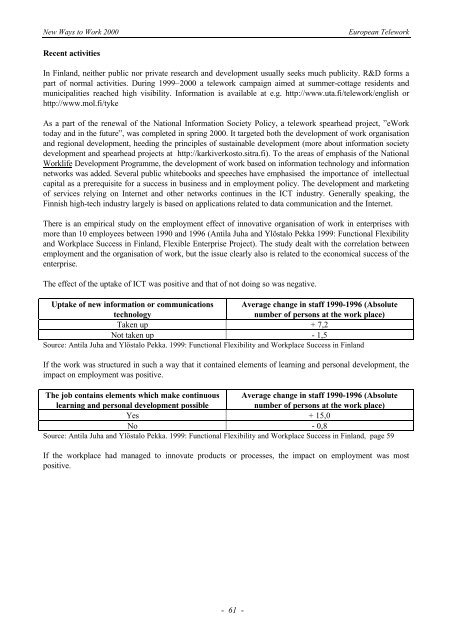eWORK 2000 - European Telework Week
eWORK 2000 - European Telework Week
eWORK 2000 - European Telework Week
- No tags were found...
You also want an ePaper? Increase the reach of your titles
YUMPU automatically turns print PDFs into web optimized ePapers that Google loves.
New Ways to Work <strong>2000</strong><strong>European</strong> <strong>Telework</strong>Recent activitiesIn Finland, neither public nor private research and development usually seeks much publicity. R&D forms apart of normal activities. During 1999–<strong>2000</strong> a telework campaign aimed at summer-cottage residents andmunicipalities reached high visibility. Information is available at e.g. http://www.uta.fi/telework/english orhttp://www.mol.fi/tykeAs a part of the renewal of the National Information Society Policy, a telework spearhead project, ”eWorktoday and in the future”, was completed in spring <strong>2000</strong>. It targeted both the development of work organisationand regional development, heeding the principles of sustainable development (more about information societydevelopment and spearhead projects at http://karkiverkosto.sitra.fi). To the areas of emphasis of the NationalWorklife Development Programme, the development of work based on information technology and informationnetworks was added. Several public whitebooks and speeches have emphasised the importance of intellectualcapital as a prerequisite for a success in business and in employment policy. The development and marketingof services relying on Internet and other networks continues in the ICT industry. Generally speaking, theFinnish high-tech industry largely is based on applications related to data communication and the Internet.There is an empirical study on the employment effect of innovative organisation of work in enterprises withmore than 10 employees between 1990 and 1996 (Antila Juha and Ylöstalo Pekka 1999: Functional Flexibilityand Workplace Success in Finland, Flexible Enterprise Project). The study dealt with the correlation betweenemployment and the organisation of work, but the issue clearly also is related to the economical success of theenterprise.The effect of the uptake of ICT was positive and that of not doing so was negative.Uptake of new information or communications Average change in staff 1990-1996 (Absolutetechnologynumber of persons at the work place)Taken up + 7,2Not taken up - 1,5Source: Antila Juha and Ylöstalo Pekka. 1999: Functional Flexibility and Workplace Success in FinlandIf the work was structured in such a way that it contained elements of learning and personal development, theimpact on employment was positive.The job contains elements which make continuous Average change in staff 1990-1996 (Absolutelearning and personal development possiblenumber of persons at the work place)Yes + 15,0No - 0,8Source: Antila Juha and Ylöstalo Pekka. 1999: Functional Flexibility and Workplace Success in Finland, page 59If the workplace had managed to innovate products or processes, the impact on employment was mostpositive.- 61 -








